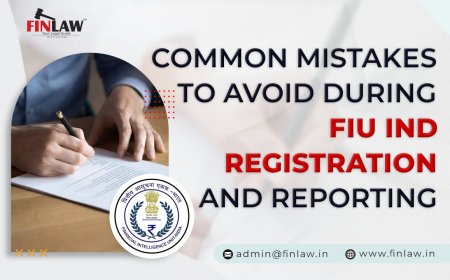Who Must Register with FIU-IND? A Complete Guide for Businesses in India
Learn who must register with FIU-IND in India, the registration process, compliance requirements, and consequences of non-compliance for businesses.

In today's digital age, combating financial crimes such as money laundering and terrorism financing has become a global priority. As part of India's commitment to curbing financial crimes, the Financial Intelligence Unit of India (FIU-IND) plays a pivotal role. Businesses across various sectors are required to register with FIU-IND to ensure compliance with the Prevention of Money Laundering Act (PMLA), 2002, and related regulations.
If you're wondering "Who must register with FIU-IND?" and how your business could be impacted, this comprehensive guide will provide all the necessary details, ensuring your company remains compliant with Indian financial regulations.
What is FIU-IND?
The Financial Intelligence Unit of India (FIU-IND) is the national agency tasked with gathering, processing, analyzing, and disseminating financial information to prevent money laundering and terrorist financing activities. FIU-IND is responsible for ensuring that businesses and financial institutions adhere to the legal framework laid out in the Prevention of Money Laundering Act (PMLA).
Key Responsibilities of FIU-IND
-
Gathering Intelligence: FIU-IND collects data from various businesses, including banks, financial institutions, and intermediaries, to analyze suspicious financial transactions.
-
Compliance Monitoring: The unit enforces compliance with regulations to prevent financial crimes like money laundering and terrorist financing.
-
Information Dissemination: FIU-IND disseminates reports on suspicious activities to law enforcement agencies, which take necessary actions based on this information.
Who Must Register with FIU-IND?
As per the PMLA and subsequent regulations, businesses that qualify as “reporting entities” are required to register with FIU-IND. These businesses must also implement strict Anti-Money Laundering (AML) and Counter Financing of Terrorism (CFT) practices. Below is a breakdown of the entities required to register:
1. Banks and Financial Institutions
All banking and financial institutions must register with FIU-IND. This category includes:
-
Scheduled commercial banks (public and private sector banks)
-
Non-Banking Financial Companies (NBFCs)
-
Cooperative banks
-
Housing finance companies
-
Insurance companies
Banks and financial institutions must report any suspicious transactions exceeding the specified threshold to FIU-IND. These institutions are at the forefront of financial transactions, making their compliance critical for the country’s anti-money laundering efforts.
2. Financial Intermediaries
Entities that facilitate the movement of funds or manage client investments are also required to register. These include:
-
Stockbrokers and Securities Market Intermediaries
-
Mutual Fund Distributors
-
Insurance Agents and Companies
-
Portfolio Managers
These intermediaries act as conduits for financial transactions, and their registration ensures that any suspicious activity can be tracked.
3. Virtual Asset Service Providers (VASPs)
With the increasing popularity of cryptocurrencies and other virtual digital assets (VDAs), FIU-IND now mandates that all businesses dealing with virtual assets must register. This includes:
-
Cryptocurrency exchanges
-
Cryptocurrency wallet providers
-
NFT platforms and other digital asset trading platforms
The Indian government has taken steps to include the crypto industry in the regulatory framework to prevent its misuse for money laundering or financing terrorism.
Guide: Step-by-Step FIU-IND Registration Process For Crypto Exchanges
4. Precious Metal Dealers
Precious metal dealers, particularly those dealing in high-value commodities like gold and diamonds, must comply with FIU-IND regulations. These dealers are often targeted for laundering illicit funds due to the ease of transferring high-value assets.
5. Money Changers and Forex Dealers
Businesses that operate in the foreign exchange market, including money changers, forex dealers, and remittance businesses, must also register. Given the volume of cross-border transactions and currency exchanges, these entities are vulnerable to misuse for illicit activities.
6. Real Estate Businesses
The real estate sector is a key area where money laundering can occur due to large financial transactions in property dealings. Therefore, real estate agents, especially those involved in high-value transactions, are required to register with FIU-IND.
7. Casinos and Gaming Entities
Due to the high volume of cash transactions in casinos and gaming establishments, these businesses are categorized as reporting entities. They must ensure that they monitor and report any suspicious financial activity related to gambling and gaming.
8. Designated Professionals
Certain professionals, when involved in financial transactions or advising clients on such transactions, are also required to register with FIU-IND. These include:
-
Chartered Accountants
-
Company Secretaries
-
Legal professionals
These professionals often act as intermediaries in financial transactions or provide services related to investments, making their registration critical to ensure that their activities are not exploited for illegal financial purposes.
Why Register with FIU-IND?
The primary objective of registering with FIU-IND is to comply with the requirements of the Prevention of Money Laundering Act (PMLA), which mandates businesses to establish and maintain robust Anti-Money Laundering (AML) and Counter-Terrorism Financing (CFT) frameworks. FIU-IND’s role is to facilitate the detection of financial crimes and assist law enforcement agencies in taking appropriate action.
FIU-IND Registration Process
The registration process with FIU-IND involves several steps. Here’s a simple breakdown:
-
Preparation for Compliance: Ensure your business is ready to meet AML-CFT standards, including appointing a Principal Officer and Designated Director.
-
Online Application: Visit the FIU-IND portal and complete the registration form, providing details about your business and compliance measures.
-
Document Submission: Submit required documents, such as business incorporation details, financial statements, and GST registration.
-
Key Personnel Appointment: Appoint a Principal Officer responsible for FIU-IND reporting and a Designated Director to oversee compliance.
-
Approval and Verification: FIU-IND reviews the application, and upon approval, your business is registered as a reporting entity.
Consequences of Non-Compliance
Businesses that fail to register with FIU-IND or comply with PMLA regulations face serious consequences, including:
-
Financial Penalties: These can range from ₹10,000 to ₹1,00,000 per violation.
-
Suspension of Operations: FIU-IND may suspend or block business operations or services if the company is found to be non-compliant.
-
Legal Actions: Non-compliant businesses may face legal scrutiny, reputational damage, and loss of business opportunities.
How to Ensure Compliance with FIU-IND Regulations
To maintain compliance with FIU-IND regulations, businesses must implement the following:
-
Develop an AML Policy: This should outline how your business will detect and prevent money laundering and terrorist financing.
-
Employee Training: Conduct regular training sessions for employees on recognizing suspicious transactions and understanding their reporting obligations.
-
Transaction Monitoring Systems: Implement robust monitoring systems to track large and unusual transactions in real time.
Conclusion
As the global financial landscape evolves, businesses in India must stay compliant with the regulatory framework established by FIU-IND. Registration is a legal requirement for entities involved in financial transactions, including banks, financial intermediaries, virtual asset providers, precious metal dealers, and more. By registering with FIU-IND, businesses not only ensure compliance with Indian laws but also contribute to a safer and more transparent financial environment.
Remember, businesses that fail to register with FIU-IND face severe penalties and reputational risks. Ensure that your business is compliant with the necessary financial regulations to avoid any unwanted legal consequences.
For more information on FIU-IND registration, visit the official FIU-IND website.
What's Your Reaction?



















